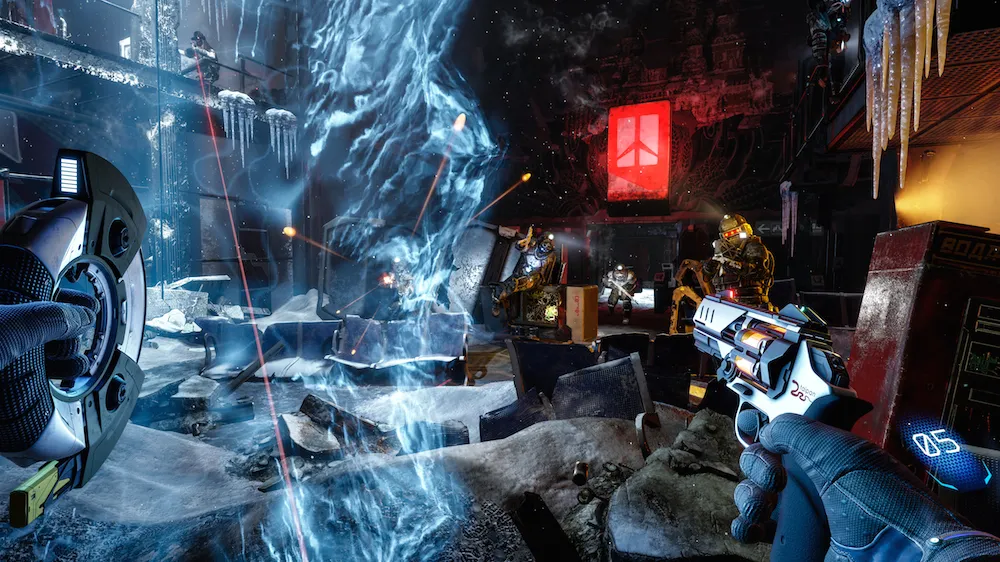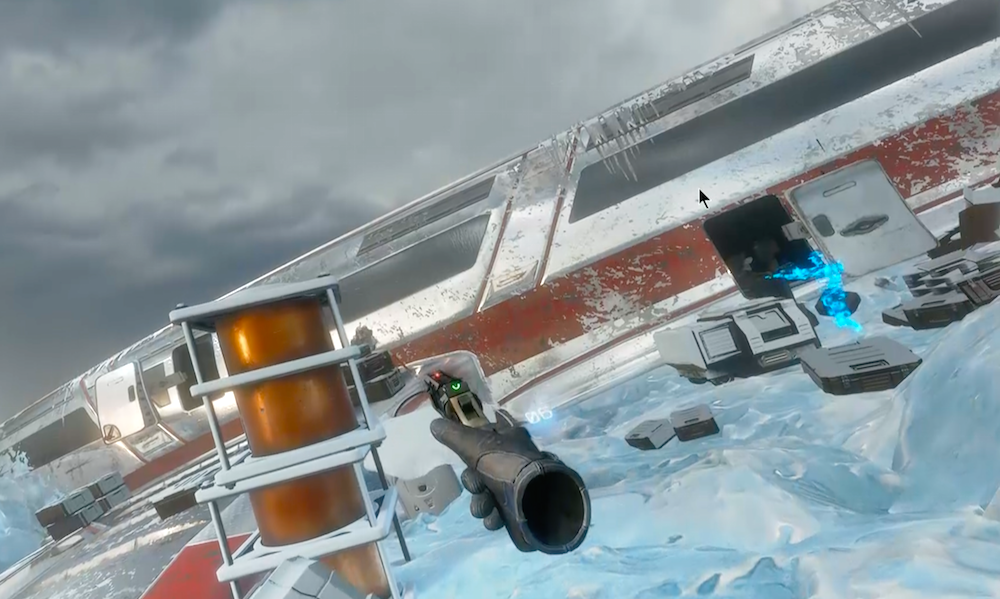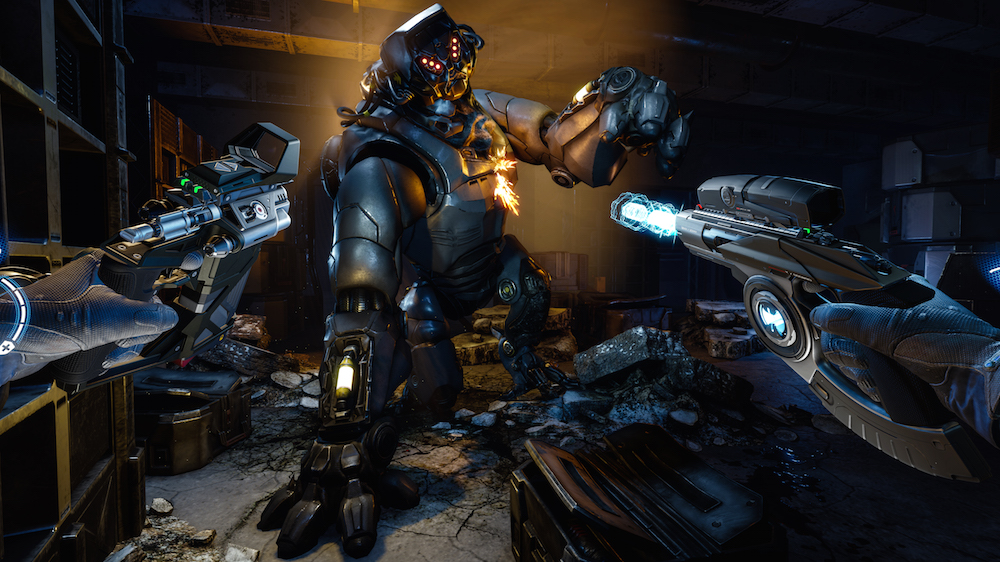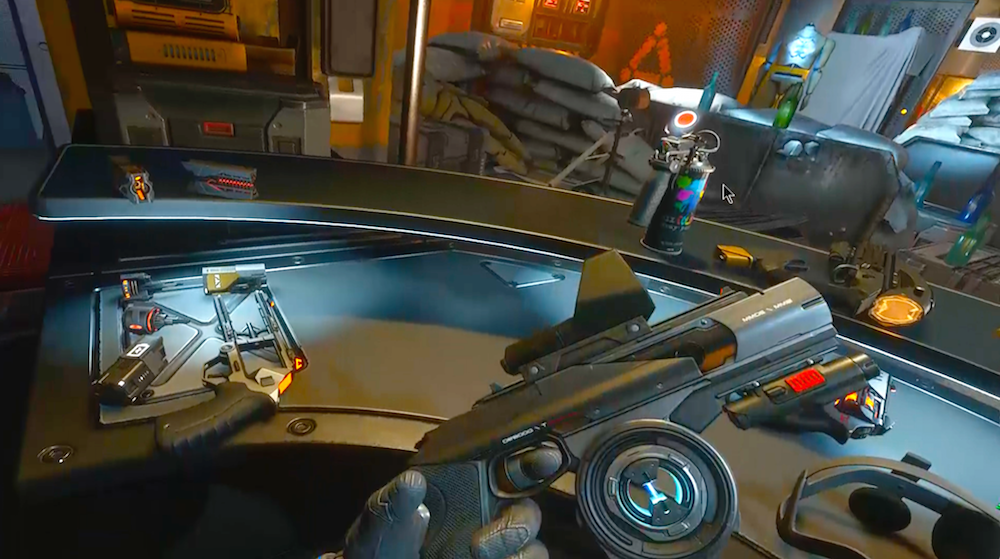Arktika.1 is one of the many virtual reality titles taking a swing at AAA adventure, coming exclusively to the Oculus Touch from the creators of the Metro series, 4A Games. It’s an assortment of guns, waves of vile bad guys, and a post-apocalyptic plot. It aims to be vast in all of the typical action ways, collecting a textbook set of parts whose sum, unfortunately, continues to feel like just one of the many.
In its best moments, Arktika.1 manages to be a mechanically sound shooter. As a mercenary brought in to clear a facility of the Arktika.1 compound, I’m given a spread of weapons to choose from before setting off. The snappy pistol reloads with a flick of the wrist. I customize my rifle with an improved sight. I lower a laser gun to my side for a new clip, then bounce its beam off a back wall to hit a target behind cover. Each weapon is unique and fun to fire, though this alone isn’t too alluring. There are, these days, quite a few titles that have fine-tuned VR shooting to be comfortable, intuitive, and joyful. It’s an inherently engaging experience unique to virtual reality, but not as unique to the games that employ it.
The action is propelled by an almost on-rails movement system. Players are to spot hologram bodies around the facility, and teleport between them to position in combat as well as traversal. This motion prevents the sickness that often follows more free first-person travel, but it also sucks tension out of Arktika.1’s dark corridors and silent corners. I don’t have to force myself to pace into unknown spaces; instead, I take that first fearful look inside, spot a projection of where I’m going to move, and then easily teleport there. And then I pop over to the next hologram, fear-free. The mechanic, combined with a lack of scripted encounters, removes the anxious wandering that usually imbues enclosed sci-fi experiences with unease.
Now and again this trail of hologram bodies is complicated by a puzzle. A locked door may need a code found across the room, or a few buttons pushed in a particular pattern. None of these roadblocks were difficult to untangle. With a limited number of teleportation points around the room, there isn’t much guess as to where you’ll find the missing puzzle piece.
The game’s combat procedure is typical–you’ll enter rooms with enemies waiting around multiple cover points. You’ll kill them. Sometimes, more will enter after that. The experience itself isn’t too surprising, but does put these likable weapons to use, giving me free reign to duck, peak, and fire shots in various combat stages.
These battles feel empty, however, because this entire series of events–filling my holsters, teleporting through dark halls, filling evil guys with laser bullets–is preceded by minutes of dry exposition. My time with Arktika.1 began in the passenger seat of an armored car, a strange woman at the wheel. As we plow through the snow, she lays out the entire premise of the campaign through a tone so unnatural that I’m unsure whether she is a human or android.
She tells me first of mankind’s struggle. Global warming caused a world-wide freeze, leaving only colonies of civilization to dot the barely livable equator. I’m meant to feel intimidated by humanity’s dour state. She details the enemies I will soon face, mean-natured bandits and animal-like monsters. She encourages me to put the latter out of their misery. I’m meant to feel some tinge of sorrow for them. We arrive at the compound, and she says I’ll be exploring quite a bit. I’m meant to feel excitement at the opening of my adventure.
As much as I want to feel these narrative emotions, I don’t, because Arktika.1 chooses from the start to tell rather than show. I don’t witness the painful struggles of society, nor any depressing beast-men losing their last shreds of humanity. I’m just told these things exist, and given virtual reality’s ability to literally surround you with stories, it’s disappointing for one with potential to be delivered in sentences rather than experiences.
The plot begins with little profound impact, the traversal is simple and without fear, the battles are visceral and unemotional. Holding my Oculus Touch controllers in the air, I’m reminded of plastic guns tied to arcade machines, games that also drop players into quick-chaos, plot-light, on-rails scenarios for the sake of enjoyable fighting.
There is room, with the 12 planned environments and solid mechanics, for Arktika.1 to better attach players to its world, but at the onset it is something more shallow than it strives for. In my time, its shooting mechanics, though solid, weren’t enough to carry the passive atmosphere or weakly developed story. Arktika.1 doesn’t seem to take make any significant step forward in VR adventure gameplay and joins a growing list of titles that already accomplish similar experiences.

































